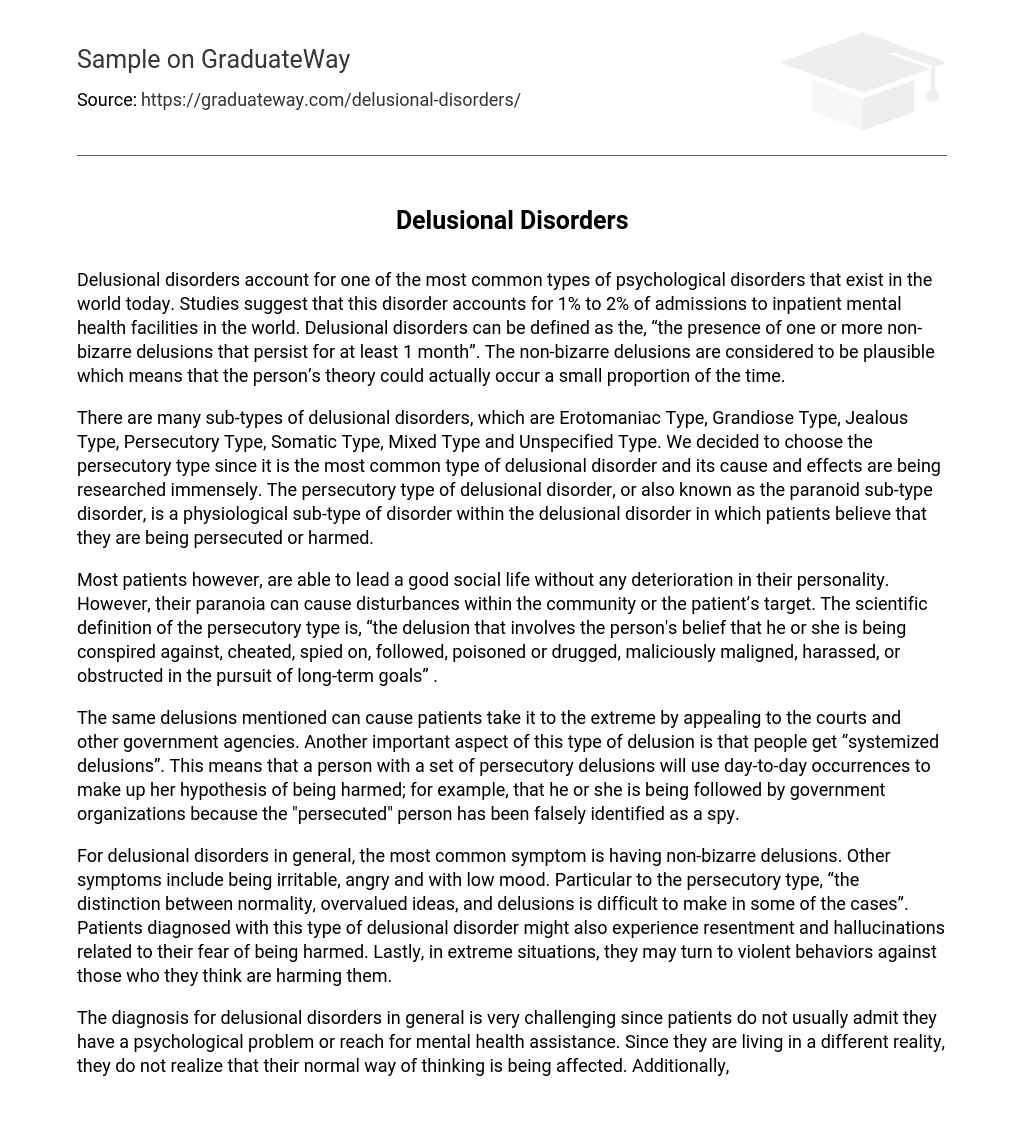Delusional disorders account for one of the most common types of psychological disorders that exist in the world today. Studies suggest that this disorder accounts for 1% to 2% of admissions to inpatient mental health facilities in the world. Delusional disorders can be defined as the, “the presence of one or more non-bizarre delusions that persist for at least 1 month”. The non-bizarre delusions are considered to be plausible which means that the person’s theory could actually occur a small proportion of the time.
There are many sub-types of delusional disorders, which are Erotomaniac Type, Grandiose Type, Jealous Type, Persecutory Type, Somatic Type, Mixed Type and Unspecified Type. We decided to choose the persecutory type since it is the most common type of delusional disorder and its cause and effects are being researched immensely. The persecutory type of delusional disorder, or also known as the paranoid sub-type disorder, is a physiological sub-type of disorder within the delusional disorder in which patients believe that they are being persecuted or harmed.
Most patients however, are able to lead a good social life without any deterioration in their personality. However, their paranoia can cause disturbances within the community or the patient’s target. The scientific definition of the persecutory type is, “the delusion that involves the person’s belief that he or she is being conspired against, cheated, spied on, followed, poisoned or drugged, maliciously maligned, harassed, or obstructed in the pursuit of long-term goals” .
The same delusions mentioned can cause patients take it to the extreme by appealing to the courts and other government agencies. Another important aspect of this type of delusion is that people get “systemized delusions”. This means that a person with a set of persecutory delusions will use day-to-day occurrences to make up her hypothesis of being harmed; for example, that he or she is being followed by government organizations because the “persecuted” person has been falsely identified as a spy.
For delusional disorders in general, the most common symptom is having non-bizarre delusions. Other symptoms include being irritable, angry and with low mood. Particular to the persecutory type, “the distinction between normality, overvalued ideas, and delusions is difficult to make in some of the cases”. Patients diagnosed with this type of delusional disorder might also experience resentment and hallucinations related to their fear of being harmed. Lastly, in extreme situations, they may turn to violent behaviors against those who they think are harming them.
The diagnosis for delusional disorders in general is very challenging since patients do not usually admit they have a psychological problem or reach for mental health assistance. Since they are living in a different reality, they do not realize that their normal way of thinking is being affected. Additionally, unless the type of disorder does not lead to illegal activities or have a major impact in the daily routine, patients with delusional disorder can adapt to social life without being interned in a clinic.
However, in the persecutory type, symptoms and actions can become more evident; patients are susceptible to have marked anger behaviors or appeal to courts and other government agencies in order to fulfill their worries. Therefore, the persecutory type might be easier to diagnose than the other types of delusional disorders. In other words, “when the Persecutory Type is associated with a precipitating event or stressor, it may have a better prognosis. ” The persecutory type is usually a chronic condition, “although a waxing and waning of the preoccupation with the delusional beliefs often occurs”.
The treatment for this disorder combines medicine or psychopharmacology and psychotherapy. The medications that are most common for this type are Risperidone, Quetiapine, and Olanzapine. These are administrated on an orally and on a daily basis. Generally, medication is not efficient if the psychotherapy is not applied as part of the treatment. Psychotherapy helps the patient improve social skills and “manage behavioral and psychological problems associated with this particular delusion”.
In synthesis, delusional disorders are very particular -and that’s how they differentiate from Schizophrenia- in the sense that they do not necessarily affect the patient’s social life and normal routine. It is only when the disorder leads to very violent behaviors and unusual activities off from their routine that it becomes a problem. The persecutory type is the one where the patient could become most aggressive and act abnormally (appeal to courts). Therefore, it is important that people are aware that there are different types of disorders, but the way they manifest themselves is what makes them unique to every patient.





